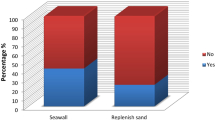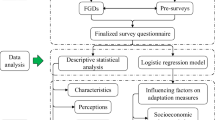Abstract
Climate change impacts will affect grassland farming in various ways in the future. Communication and knowledge transfer are crucial to implement on-farm adaptation measures required to meet these challenges in a timely way. Therefore, we need to know how grassland farmers perceive climate change and which factors influence their attitude. We hypothesized that besides direct factors such as region, farm size, age and education, farmers’ socio-cultural background and their beliefs and attitudes are most important in their reaction to climate change. To investigate this, we conducted a survey with extensive on-farm interviews (n = 82) in four distinctive regions in the North German Plain on a gradient from sub-maritime to areas with sub-continental climate. We found that with a more continental climate and less rainfall and with increasing farm size, grassland farmers were more aware of the implications of climate change. In a second step, to categorize the influence of personal beliefs on decisions concerning farming, we applied the typology approach and distinguished four farming styles. Farmers in the four groups differed in terms of climate change awareness and adaptation preferences (P < 0.05). Yield Optimizers and Modernists were more open-minded to rational and economic facts and showed a significantly greater willingness to implement adaptation measures than Idealists and Traditionalists, who need to be addressed at a more emotional level. The results of this study may contribute to the development of better‐targeted adaptation policies that will serve specific groups of farmers more effectively.



Similar content being viewed by others
References
ABS (Australian Bureau of Statistics) (2008) Farm Management and Climate 4625.0 2006–07
Adger WN, Dessai S, Goulden M, Hulme M, Lorenzoni I, Nelson DR, Naess LO, Wolf J, Wreford A (2009) Are there social limits to adaptation to climate change? Clim Change 93:335–354
Ahnström J, Höckert J, Bergea HL, Francis CA, Skelton P, Hallgren L (2008) Farmers and nature conservation: what is known about attitudes, context factors and actions affecting conservation? Renew Agric Food Syst 24:38–47
Ajzen I (1991) The theory of planned behavior. Organ Behav Hum Decis Process 50(2):179–211
Arbuckle JG Jr, Morton LW, Hobbs J (2013) Farmer beliefs and concerns about climate change and attitudes toward adaptation and mitigation: evidence from Iowa. Clim Change 118(3–4):551–563
Barnes AP, Toma L (2012) A typology of dairy farmer perceptions towards climate change. Clim Chang 112:507–522
Bryant CR, Smit B, Brklacich M, Johnston TR, Smithers J, Chiotti Q, Singh B (2000) Adaptation in Canadian agriculture to climatic variability and change. Clim Change 45(1):181–201
Bühner M (2006) Einführung in die Test- und Fragebogenkonstruktion. Pearson Studium, München
Bundesministerium für Ernährung, Landwirtschaft und Verbraucherschutz (2013) Die wirtschaftliche Lage der landwirtschaftlichen Betriebe Buchführungsergebnisse der Testbetriebe Wirtschaftsjahr 2011/2012. http://berichte.bmelv-statistik.de/BFB-0111001-2012.pdf, accessed 30 May 2014
Burger-Scheidlin H, Christanell A, Vogl CR (2009) Wetter—Wahrnehmung—Wissen. In: Der kritische Agrarbericht: Schwerpunkt: Landwirtschaft im Klimawandel. Abl Bauernblatt Verlag, Hamm, pp 261–265
Commandeur MAM (2006) Diversity of pig farming styles: understanding how it is structured. NJAS Wagening J Life Sci 54(1):111–127
Dahl S, Sauer S (2012) Landwirtschaftszählung 2010 Heft 1 Teil A—Gemeindeergebnisse, Betriebsgrößenstruktur, Bodennutzung, Viehhaltung. Landesbetrieb für Statistik und Kommunikationstechnologie Niedersachsen (eds.). Statistische Berichte Niedersachsen
Defra (2008) Bringing theoretical and applied evidence together from across Defra and highlighting policy relevance and implications for future research, November 2008. In: Pike T (ed) Defra agricultural change and environment observatory discussion paper. http://archive.defra.gov.uk/evidence/statistics/foodfarm/enviro/observatory/research/documents/ACEO%20Behaviours%20Discussion%20Paper%20%28new%20links%29.pdf. Accessed 17 Sept 2013
Deressa TT, Hassan RM, Ringler C (2011) Perception of and adaptation to climate change by farmers in the Nile basin of Ethiopia. J Agric Sci 149(01):23–31
Donnelly D, Mercer R, Dickson J, Wu E (2009) Understanding behaviours, attitudes and preferences relating to climate change. Australia’s farming future market research—final report 2009. http://www.daff.gov.au/climatechange/australias-farming-future. Accessed 10 Sept 2013
Edwards-Jones G, Deary I, Willock J (1998) Incorporating psychological variables in models of farmer behaviour: does it make for better predictions? Etudes & Recherches sur les Systèmes Agraires et le Développement 31:153–173
Evans C, Storer C, Wardell-Johnson A (2011) Rural farming community climate change acceptance: impact of science and government credibility. Int J Soc Agric Food 18(3):217–235
Gill T (2012) Are farmers ready for the challenge of climate change? Environment Agency, Solihull. http://publications.environment-agency.gov.uk/PDF/GEMI0512BWKV-E-E.pdf. Accessed 2 Sept 2013
Gramig BM, Barnard JM, Prokopy LS (2013) Farmer beliefs about climate change and carbon sequestration incentives. Clim Res 56:157–167
Grothmann T, Patt A (2003) Adaptive capacity and human cognition. Open meeting of the global environmental change research community, Montreal, Canada, 16–18 Oct 2003
Haberlandt U, Belli A, Hölscher J (2010) Trends in beobachteten Zeitreihen von Temperatur und Niederschlag in Niedersachsen. Hydrol Wasserbewirtsch 54(1):28–36
Haden VR, Niles MT, Lubell M, Perlman J, Jackson LE (2012) Global and local concerns: what attitudes and beliefs motivate farmers to mitigate and adapt to climate change? PLoS One 7(12):e52882. doi:10.1371/journal.pone.0052882
Hageback J, Sundberg J, Ostwald M, Chen D, Yun X, Knutsson P (2005) Climate variability and land-use change in Danangou Watershed, China—examples of small-scale famers’ adaptation. Clim Change 72:189–212
Hopkins A, Del Prado A (2007) Implications of climate change for grassland in Europe: impacts, adaptations and mitigation options: a review. Grass Forage Sci 62:118–126
Howden SM, Soussana J-F, Tubiello FN, Chhetri N, Dunlop M, Meinke H (2007) Adapting agriculture to climate change. Proc Natl Acad Sci 104(50):19691–19696
Idrisa YL, Ogunbameru BO, Ibrahim AA, Bawa DB (2012) Analysis of awareness and adaptation to climate change among farmers in the Sahel Savannah agro-ecological zone of Borno State, Nigeria. Br J Environ Clim Chang 2(2):216–226
Jackson LE, Wheeler SM, Hollander AD, O’Geen AT, Orlove BS, Six J, Sumner DA, Santos-Martin F, Kramer JB, Horwath WR, Howitt RE, Tomich TP (2011) Case study on potential agricultural responses to climate change in a California landscape. Clim Chang 109:407–427
Juroszek P, von Tiedemann A (2011) Potential strategies and future requirements for plant disease management under a changing climate. Plant Pathol 60:100–112
Karrer SL (2012) Swiss farmers’ perception of and response to climate change. Dissertation, Eidgenössische Technische Hochschule Zürich No. 20410
Koffs LS (2008) Going all in: the gamble of globalization and european economic integration. Pepperdine Pol Rev 1:6. http://digitalcommons.pepperdine.edu/ppr/vol1/iss1/6. Accessed 17 Mar 2014
Macgregor CJ, Warren CR (2006) Adopting sustainable farm management practices within a Nitrate Vulnerable Zone in Scotland: the view from the farm. Agric Ecosyst Environ 113:108–119
McCrea R, Dalgleish L, Coventry W (2005) Encouraging use of seasonal climate forecasts by farmers. Int J Climatol 25:1127–1137
McRae-Williams P (2009) WIDCORP 1/09. Understanding farmer knowledge and attitudes to climate change, climate variability, and greenhouse gas emissions. http://www.widcorp.com/publications.php. Accessed 10 Sept 2013
Mendelsohn R (2000) Efficient adaptation to climate change. Clim Change 45:583–600
Mueller L, Behrendt A, Schalitz G, Schindler U (2005) Above ground biomass and water use efficiency of crops at shallow water tables in a temperate climate. Agric Water Manag 75(2):117–136
Niles MT, Lubell M, Brown M, Dynes R (2013) Hawke’s Bay, New Zealand farmer climate change perspectives and concerns. http://environmentalpolicy.ucdavis.edu/project/climate-change-and-agriculture. Accessed 12 Nov 2013
OECD (2008) Economic aspects of adaptation to climate change. Costs, Benefits and Policy Instruments. ISBN-978-92-64-04603-0
OECD (2012) Farmer behaviour, agricultural management and climate change. OECD Publishing. doi:10.1787/9789264167650-en
Olesen JE, Bindi M (2002) Consequences of climate change for European agricultural productivity, land use and policy. Eur J Agron 16:239–262
Orlowsky B, Gerstengarbe F-W, Werner PC (2008) A resampling scheme for regional climate simulations and its performance compared to a dynamical RCM. Theor Appl Climatol 92(3-4):209–223
Owensby CE, Coyne PI, Ham JM, Auen LM, Knapp AK (1993) Biomass production in a tallgrass prairie ecosystem exposed to ambivalent and elevated CO2. Ecol Appl 3(4):644–653
Owensby CE, Cocran RC, Auen LM (1996) Effects of elevated carbon dioxide on forage quality for ruminants. In: Körner C, Bazzaz F (eds) Carbon dioxide, populations, and communities. Academic Press, San Diego, pp 363–371
Pannell DJ (2003) Uncertainty and adoption of sustainable farming systems. In: Babcock BA, Fraser RW, Lekakis JN (eds) Risk management and the environment: agriculture in perspective. Kluwer, Dordrecht, pp 67–81
Reilly J, Schimmelpfennig D (2000) Irreversibility, uncertainty and learning: portraits of adaptation to long-term climate change. Clim Change 45:253–278
Rogers EM (1983) Diffusion of innovations. The Free Press, New York. ISBN 0-02-926650-5
Rogers A, Ainsworth EA, Leakey ADB (2009) Will elevated carbon dioxide concentration amplify the benefits of nitrogen fixation in legumes? Plant Physiol 151:1009–1016
Ruget F, Moreau JC, Cloppet E, Souverain F (2010) Effect of climate change on grassland production for herbivorous livestock systems in France. Grassl Sci Eur 15:75–77
Scheffer F, Schachtschabel P (2002) Lehrbuch der Bodenkunde, 15th edn. Spektrum Akademischer Verlag, Heidelberg
Schmitzberger I, Wrbka T, Steurer B, Aschenbrenner G, Peterseil J, Zechmeister HG (2005) How farming styles influence biodiversity maintenance in Austrian agricultural landscapes. Agric Ecosyst Environ 108:274–290
Schroeder LA, Isselstein J, Chaplin S, Peel S (2013) Agri-Environment Schemes: farmers’ acceptance and perception of potential ‘Payment by Results’ in grassland? A case study in England. Land Use Policy 32:134–144
Scott J, Marshall G (2009) A dictionary of sociology. Oxford University Press, Oxford
Soussana JF, Tallec T, Blanfort V (2010) Mitigating the greenhouse gas balance of ruminant production systems through carbon sequestration in grasslands. Animal 4(3):334–350
Sunding D, Zilberman D (1999) The agricultural innovation process: research and technology adoption in a changing agricultural sector. In: Gardner B, Rausser G (eds) Handbook of agricultural economics, vol 1A. Elsevier, Amsterdam, pp 207–261
Thomas DSG, Twyman C, Osbahr H, Hewitson B (2007) Adaptation to climate change and variability: farmer responses to intra-seasonal precipitation trends in South Africa. Clim Change 83:301–322
Van der Ploeg JD (1994) Styles of farming: An introductory note on concepts and methodology. In: Van der Ploeg JD, Long A (eds) Born from within: practice and perspectives of endogenous rural development. Van Gorcum, Netherlands, pp 7–30
Vanclay F, Howden P, Mesiti L, Glyde S (2006) The social and intellectual construction of farming styles: testing Dutch ideas in Australian agriculture. Sociol Rural 46:61–82
Weber EU (2010) What shapes perceptions of climate change? Wiley Interdiscip Rev Clim Change 1(3):332–342
Weiber R, Mühlhaus D (2010) Strukturgleichungsmodellierung—Eine anwenderorientierte Einführung in die Kausalanalyse mit Hilfe von AMOS. SmartPLS und SPSS, Berlin
Weigel HJ (2005) Gesunde Pflanzen unter zukünftigem Klima. Wie beeinflusst der Klimawandel die Pflanzenproduktion? Gesunde Pflanz 57:6–17
Wilson GA (1997) Factors influencing farmer participation in the environmentally sensitive areas scheme. J Environ Manage 50:67–93
Acknowledgments
This project (Nachhaltiges Landmanagement im Norddeutschen Tiefland, FKZ 033L029) was supported by the German Ministry of Research (BMBF).
Author information
Authors and Affiliations
Corresponding author
Additional information
Editor: Wolfgang Cramer.
Rights and permissions
About this article
Cite this article
Eggers, M., Kayser, M. & Isselstein, J. Grassland farmers’ attitudes toward climate change in the North German Plain. Reg Environ Change 15, 607–617 (2015). https://doi.org/10.1007/s10113-014-0672-2
Received:
Accepted:
Published:
Issue Date:
DOI: https://doi.org/10.1007/s10113-014-0672-2




